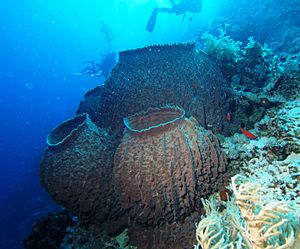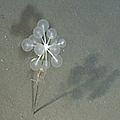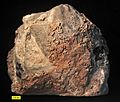Demosponge facts for kids
Quick facts for kids Demospongiae |
|
|---|---|
 |
|
| Barrel sponge (Xestospongia testudinaria) | |
| Scientific classification | |
| Kingdom: | |
| Phylum: | |
| Class: |
Demospongiae
|
| Subclasses | |
|
Homoscleromorpha |
|
The Demospongiae are the biggest group of animals in the sponge family, called Porifera. Think of them as the most common type of sponge you might find. Their bodies are supported by a kind of skeleton. This skeleton is made of tiny, needle-like pieces called spicules. These spicules can be made from a flexible protein called spongin, a hard mineral called silica, or sometimes both! If they have silica spicules, these look different from the spicules found in another type of sponge, the glass sponges.
Contents
What are Demospongiae?
Demospongiae are a large and diverse group of sponges. They live all over the world, from shallow coastal waters to the deep ocean. You can find them in many different shapes and sizes. Some look like colorful carpets, while others are tall and branching. They are an important part of ocean ecosystems.
Their Amazing Skeletons
The skeleton of a demosponge is very special. It gives the sponge its shape and support.
- Spongin: This is a soft, flexible protein. It's what makes natural bath sponges feel squishy.
- Silica: This is a hard, glass-like mineral. It forms tiny, sharp needles called spicules. These spicules help protect the sponge.
Many demosponges have skeletons made of both spongin and silica. The way these materials are put together helps scientists identify different types of demosponges.
How Demospongiae Live
Demospongiae are filter feeders. This means they pull water through their bodies. They have tiny pores (holes) that let water in. Inside, special cells capture tiny bits of food, like bacteria and plankton. Then, the cleaned water leaves through a larger opening. This process helps keep the ocean water clean.
Most demospongiae are attached to rocks or other surfaces. They can't move around like fish. They are often brightly colored, which helps them blend in or stand out in their underwater homes.
Images for kids
-
Fossil chaetetid from the Bird Spring Formation (Upper Carboniferous) of southern Nevada.
See also
 In Spanish: Demosponjas para niños
In Spanish: Demosponjas para niños
 | Jessica Watkins |
 | Robert Henry Lawrence Jr. |
 | Mae Jemison |
 | Sian Proctor |
 | Guion Bluford |










